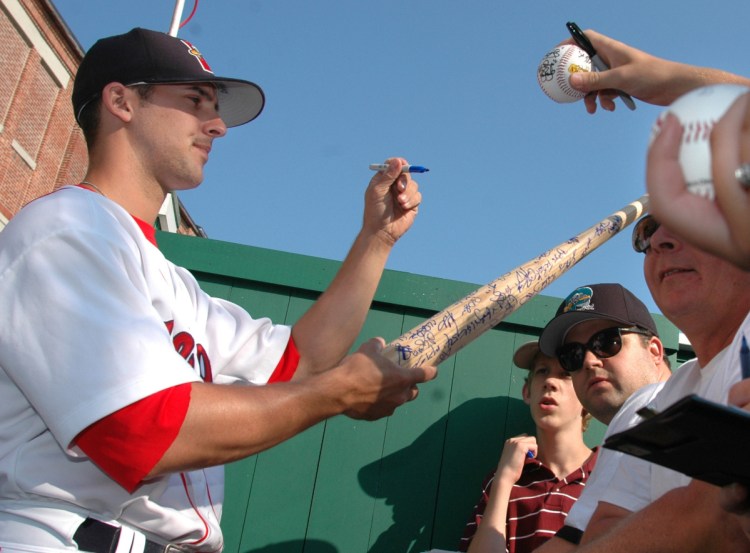Chris Durbin brought his three sons to Arlington, Texas, in early May to watch the Boston Red Sox. He could point out the stars, like outfielders J.D. Martinez and Mookie Betts.
J.D. Martinez makes $24 million this year, Betts $10.5 million.
Durbin, 37, was once an outfielder in the Red Sox organization. In his final season, in 2006 with the Portland Sea Dogs, he made $9,240.
The next year, 2007, Durbin retired at the end of spring training.
“I was just stuck,” Durbin said by phone from Texas, where now lives. “I had a wife and a kid.”
Not only was Durbin not making much money, he believed he had no future with the Red Sox but was contractually obligated to stay in the organization.
It’s one of the obstacles for minor league baseball players. Although their employer – Major League Baseball – considers them interns or seasonal workers, the players are controlled by one organization for up to seven years.
“I felt I was good enough to be in the big leagues but Boston had some high-profile players. I didn’t feel like I had a fair shot to make it with Boston.
Indeed, Boston’s 2007 outfield featured Manny Ramirez, Coco Crisp and J.D. Drew. Plus a young phenom named Jacoby Ellsbury was moving up the ranks. And there were others ahead of him.
Durbin’s difficulty was two-edged. He wasn’t a high-profile prospect and couldn’t leave as a free agent until after the 2009 season. Minor league players are under control of the team that drafted them for seven years unless they are traded or released.
“I didn’t feel like it was worth it, playing the waiting game,” Durbin said.
Durbin thought it would turn out better. In 2002 he was considered one of the best college outfielders as a senior at Baylor, batting .346 with 18 home runs. Durbin said scouts told him he could be drafted in the first five rounds.
Instead, Boston drafted him in the 10th round – while Baylor teammate David Murphy was taken in the first round. Murphy, a junior, received a $1.5 million signing bonus. Durbin, a senior, was offered $20,000. He negotiated that to $31,000.
“It put a sour taste in my mouth,” Durbin said, “but I still had a shot.”
In 2005 the Sea Dogs’ outfield featured Durbin, Murphy and another touted prospect, Brandon Moss. Durbin and Moss made the Eastern League All-Star Game that year and, among the three, Durbin had the best average (.282) and OPS (.801) – although he played 32 fewer games because of injury.
During spring training in 2006, Durbin learned the difference between being a prospect and a nonprospect.
“I did not get invited to big league camp but Murphy and Moss did,” he said.
That’s not unusual.
“They don’t treat everyone the same,” said James Masteralexis, a sports agent and an assistant professor of business law at Western New England University.
“The guys that get drafted lower don’t get the money and don’t get the opportunities. The players with the bigger bonus, teams have to justify paying you that much.”
All three outfielders returned to Portland in 2006, although Murphy was soon promoted to Triple-A, then reached the majors.
Durbin and Moss stayed, and helped the Sea Dogs win their only Eastern League championship. Durbin caught the final out of the title-clinching game.
Durbin was miserable during spring training the next year, seeing his career going nowhere. He made more money in the offseason working menial jobs.
He met with Boston General Manager Theo Epstein and requested either a trade or to be released. Epstein said no.
Durbin retired on March 19. He returned to Texas and now is a policeman in Grand Prairie.
“I quit on my own terms,” Durbin said.
Kevin Thomas can be reached at 791-7411 or:
kthomas@pressherald.com
Twitter: @ClearTheBases
Send questions/comments to the editors.




Comments are no longer available on this story